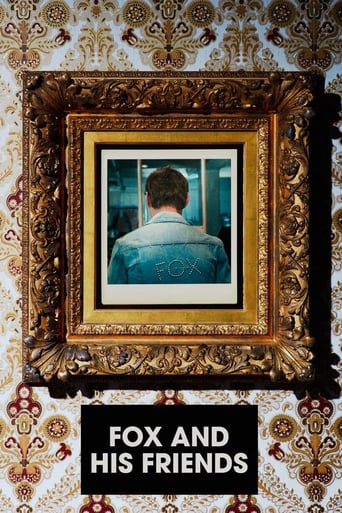
LGBT Cinema are movies that either deal with LGBT topics or are concerned with the lives of people inside the LGBT community. Rainer Werner Fassbinder’s, “Fox and his Friends”, is the latter of those two types of movies. It is also one of the best of its kind. Dealing with a melodramatic story of love and betrayal, the movie works more as a conflict between the class cultures in Germany than anything else. By the time the movie ends, I was so caught up in the story, that the fact that it is set entirely within the German LGBT community in the 1970s, became an almost unnoticeable aspect of the film.
“Fox and his Friends” is a tragedy that concerns the rise and fall of one Franz Bieberkopf (Fassbinder himself who proves that he was no slouch when it came to acting). Franz works in a carnival under the synonym of, “Fox the talking head”, and the movie opens as the creator of this carnival act, who is also Franz’s lover, is arrested for tax evasion, leaving France unemployed. France is a lottery addict who needs to consistently purchase lottery tickets each week and when his last bit of cash is stolen, he reverts to prostitution so that he can buy the current week’s ticket. Due to time constraints, he still needs to steal money to buy his ticket and does that at a local florist. Franz is introduced as Fox by his well to do trick Max (Karlheinz Bohm). It turns out that the lottery ticket he purchased was the winning ticket with a 600,000 German Mark prize. One of Max’s friends is Eugen (Peter Chatel) who, while initially showing his disgust at Franz’s lower-class sensibilities, changes his attitude once he realizes that France won the lottery. By seducing France, Eugen uses deceit and dishonesty, and works to psychologically destroy Franz’s self-esteem, taking advantage of his kindness in attempting to slyly steal all his newfound wealth.
Once France and Eugen are a couple, Eugen will slowly and with cold intent work to first make France feel like he is entering an equal world within Eugen’s own world of money and manners, while at the same time making him feel inept at every turn. This emotional manipulation was very clear to me from the beginning, which made it equally sad to watch how Franz did not realize what was happening before it was too late. Interestingly, when they initially meet, Franz is shown as a confident free soul, as if he is in control of the situation. His slow sad transformation into a victim was utterly believable. The fact that I saw it coming a mile away did not ruin the authenticity, as Franz’s lack of intelligence was never in question. Within this relationship, Fassbinder gives an insightful critique of German society that differentiates people through class and money. Love, which is the strongest of emotions, gets purchased here for money. Franz has no qualms about prostituting himself when he is poor, which is a characteristic of his that Eugen takes full advantage of. Franz is now more than willing to use his money to attain what he once thought was an unattainable love and lifestyle, while at the same time, it is Eugen who becomes the prostitute. Love, social standing and money have never been more cynically interwoven than how they are portrayed in this movie.
It is quite interesting that, as a very liberal and freely showing LGBT film, “Fox and his friends”, is in a way a little conservative with its view on the German LGBT community in the early 70s, all the while retaining a universal story of love and betrayal. There are depictions of bathroom sex, bath houses, and promiscuity, yet the story is so beautifully laid out and expressed, that the background of where it takes place becomes less significant.
Similar to many of Fassbinder’s movies, “Fox and his Friends” revolves most of its drama within closed interiors that feel almost prison-like to its characters. When Franz purchases a fancy apartment, he is made to feel immediately like an uninvited guest, through the personality of Eugen, who controls not only the living schedule of the flat, but also its complete design. It would be made quite clear to Franz that his lower-class sensibilities would not allow him to make decisions in his new life. He becomes a prisoner in the short-term luxury created by his sudden and unexpected wealth. I remember being struck by stories of suddenly successful athletes who become extremely wealthy and just as quickly lose their wealth to others. “Fox and his Friends” is a great example of this exact repeated social phenomenon.
Other than Franz’s poor alcoholic sister and some boring spouses, who are married for money, all the characters in the movie belong to the LGBT community, making “Fox and his Friends” not only a terrific melodrama, but also a great example that, no matter who you are, we as human beings are pretty much all the same. Not only is that a great message, but the movie it also comes from is an excellent slice of life from post-war Germany.

